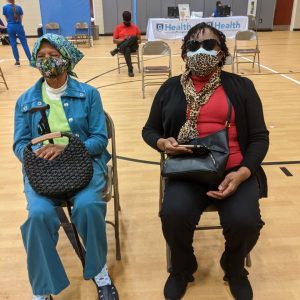Lt. Gov. Geoff Duncan and Senators Ben Watson and Max Burns joined AU Health’s top brass Thursday for a tour of the hospital’s COVID-19 vaccination pop-up clinic at Good Shepherd Baptist Church on Olive Road.
AU CEO Brooks Keel introduced Duncan to a small crowd during a briefing afterward. Chief Medical Officer Phillip Coule was on-hand to answer COVID-related questions.
Duncan said the Good Shepard clinic is a prime example of the kind of uncommon partnerships that it takes to fight the pandemic: partnerships between state government, faith communities, higher education, healthcare workers, federal government and volunteers.
“This is an incredible example of leadership,” he said and later described the clinic as calm, warm and inviting.
Immunity kicks in about two weeks after the second shot of either Pfizer’s or Moderna’s vaccination according to the Center for Disease Control and Prevention, Watson said. Currently, research results show the 95% effective immunity lasts about three months, he said. Coule said those projections are “conservative.”
[adrotate banner=”19″]
“I’m sure that we are going to have data that will show that its even longer than three months. It’s just that we don’t know,” Watson said and disclosed that he is included in a two-year Moderna vaccine study and received his second dose last September. “We should have good data on that in the near future.”
Coule said AU Health administers both Pfizer and Moderna’s vaccines at its pop-up clinics. Due to the hospital’s capability to provide the “ultracold storage” that the Pfizer vaccine requires, it is administering the Pfizer vaccine more often than Moderna’s.
“We are having discussions about the Johnson & Johnson vaccine,” he said. “It is not approved yet. As soon as it approved, then we will be discussing a strategy around the use of that vaccine.”
Rev. Clarence Moore said nearly 2,000 vaccinations have been administered at the Olive Road location since Jan. 28, with approximately 80% of the shots administered to members of the black community.
Rosa Biles, Evans, stayed for the briefing after receiving her second dose of the COVID-19 vaccine. She said she registered for the vaccine at the Good Shepard clinic through AU’s online registration system. She reported no complications or side effects after the first dose.

“It is a relief,” she said of receiving the second dose and pointed out she will continue to wear a mask and adhere to social distancing recommendations.
March 15th marks the 1-year anniversary that AU received emergency authorization for its first in-house-developed COVID-19 laboratory tests, the first such tests in the State of Georgia outside of the CDC and the Department of Health, Keel said.
“It was the very early hours of the next morning that we confirmed the first positive case of COVID-19 here at Augusta University Health using this new technology, and our world was forever changed,” he said and pointed out that Gov. Brian Kemp asked the medical facility to take what it learned locally and apply it statewide. Currently, the hospital has administered more than 27,000 COVID-19 vaccines throughout Georgia and South Carolina.
Since Jan. 25, AU Health has partnered with local churches and the Georgia Department of Public Health to provide greater access to COVID vaccines through pop-up clinics. The hospital’s vaccination program kicked off with local church leaders receiving their vaccines at Good Shepard Church.
Duncan chose the appearance at the Good Shepard location in-part because of its accessibility to the Black and Latino communities who demonstrate a hesitancy to be vaccinated, said Watson who serves as chairman of the Health and Human Services Committee. He also served on Kemp’s original Coronavirus task force.
Kemp announced that vaccinations will include teachers and school employees, along with vulnerable residents in March, during a separate press conference that took place later in the day.
Shellie Smitley is a staff writer for The Augusta Press. Reach her at shellie@theaugustapress.com
[adrotate banner=”35″]











